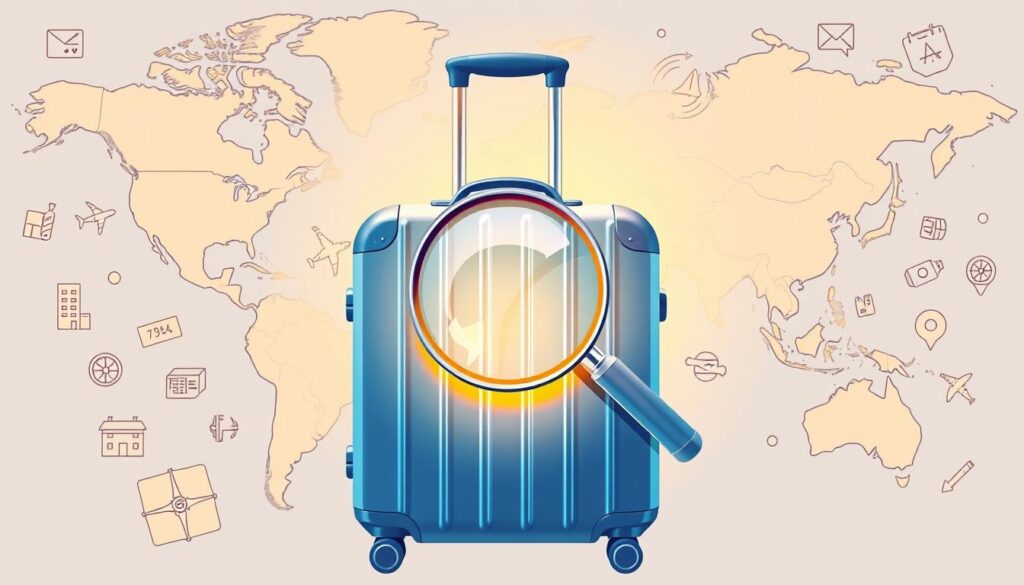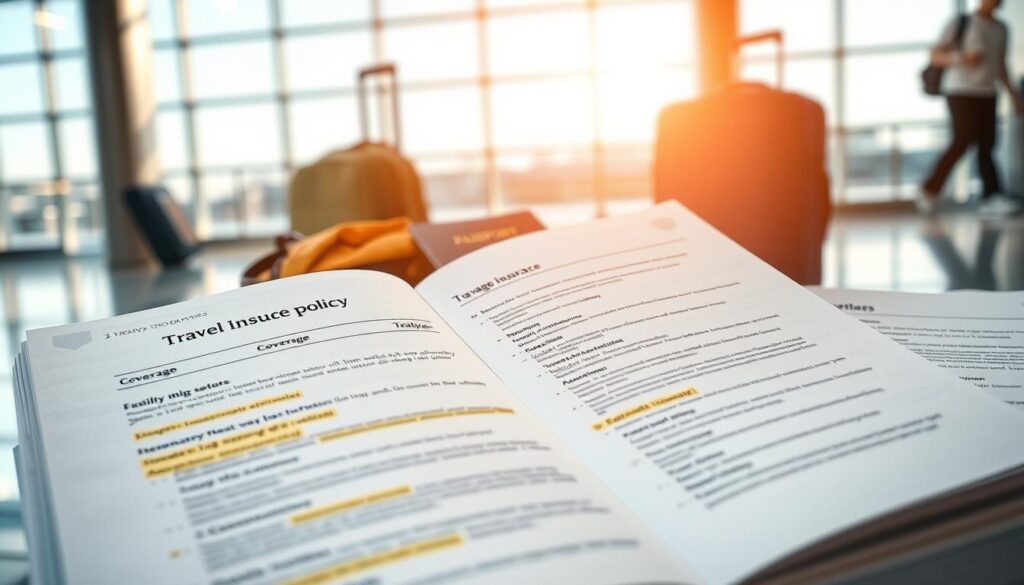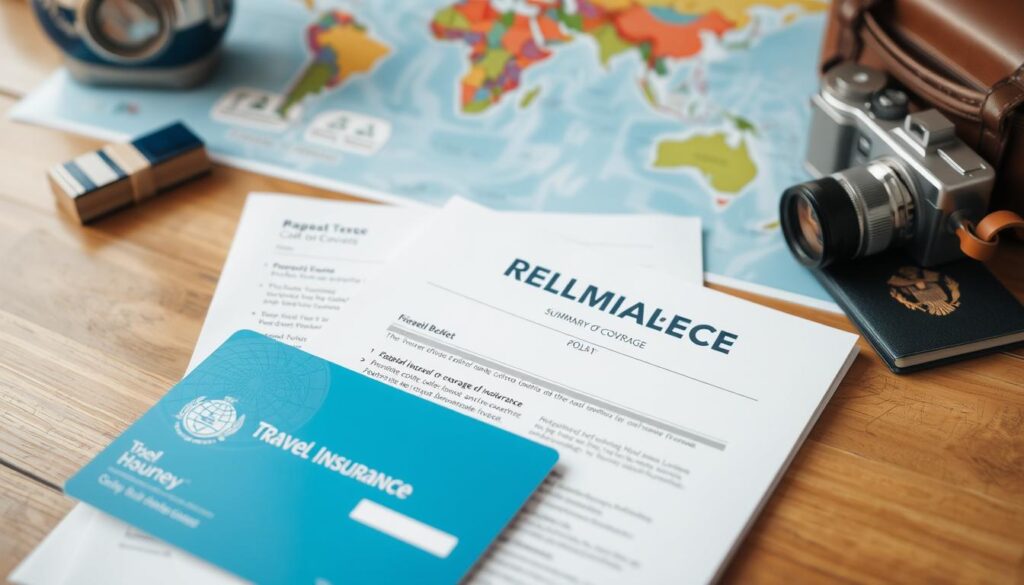Travel Insurance Explained:
Do You Really Need It?
Are you planning a trip abroad, but wondering if travel insurance is really necessary?

Many travelers think their regular health insurance or credit card benefits will cover them abroad. But this is not always true.
Unexpected medical or travel-related expenses can be very costly. This makes travel insurance a key part of planning your next trip.
Key Takeaways
- Understanding what travel insurance covers can save you from unexpected expenses.
- Not all travel insurance policies are created equal; choose one that fits your needs.
- Travel insurance can provide financial protection against trip cancellations or interruptions.
- Medical emergencies abroad can be costly without proper insurance coverage.
- Reviewing your existing insurance policies can help determine if additional travel insurance is needed.
Understanding Travel Insurance Basics
Learning about travel insurance can help you avoid financial losses on your trips. It’s made to protect you from different risks when you travel, both at home and abroad.
What Travel Insurance Actually Covers
Travel insurance policies cover many things that could affect your trip. Core protection elements usually include:
Core Protection Elements
- Medical emergencies and evacuations
- Trip cancellations or interruptions
- Luggage loss or damage
- Travel delays
Optional Add-ons Worth Considering
Many insurance providers also offer optional add-ons to improve your policy. These can include coverage for adventure sports, rental car protection, or insurance for certain destinations.

Common Types of Travel Insurance Policies
There are many types of travel insurance policies, each for different needs and travel plans.
Comprehensive vs. Basic Coverage
Comprehensive policies give wide protection, including medical, trip cancellation, and luggage coverage. Basic policies, though, only cover the most basic risks.
Specialized Insurance Options
Some providers offer specialized policies for certain types of travel, like cruise or backpacking insurance. These are made for the unique risks of these trips.
| Policy Type | Coverage | Best For |
|---|---|---|
| Comprehensive | Medical, trip cancellation, luggage | Travelers seeking broad protection |
| Basic | Essential risks only | Travelers on a budget |
| Specialized | Unique risks for specific trips | Travelers with specific needs |
Travel Insurance Explained: Do You Really Need It?
Travel insurance isn’t for everyone. It’s important to think about your own risks before deciding. Knowing what you need helps figure out if insurance is right for you.
Assessing Your Personal Risk Factors
Before deciding on travel insurance, consider these factors:
- Your destination and its risks
- The length and complexity of your trip
- The cost of your trip and any prepaid expenses
Destination-Specific Considerations
Destinations vary in risk levels. Places with health concerns or political instability might need more coverage. Look at the local healthcare and any travel advisories for your destination.
Trip Duration and Complexity
Long or complex trips, like multi-destination itineraries or adventure travel, might need insurance. This is because they face more risks of disruptions or emergencies.

When Travel Insurance Is Non-Negotiable
In some cases, travel insurance is a must, not just a good idea.
International Travel Requirements
For international travel, many countries require valid travel insurance to enter. Make sure you know the specific rules for your destination.
High-Value or Prepaid Trips
If your trip is expensive, insurance can protect your investment. It helps against unexpected cancellations or interruptions.
| Trip Type | Insurance Recommendation |
|---|---|
| International Travel | Highly Recommended |
| High-Value Trips | Essential |
| Domestic Travel | Optional, but consider trip duration and complexity |
By looking at your personal risks and knowing when insurance is a must, you can choose wisely for your next trip.
Key Coverage Components Worth Considering
When you’re getting ready to travel, knowing what travel insurance covers is key. It helps you feel secure and protects your wallet. Travel insurance shields you from many risks, like medical emergencies and travel problems.
Medical Emergency Coverage
Medical emergency coverage is a must-have in travel insurance. It usually includes:
- Coverage for hospital stays and medical treatment abroad
- Emergency medical evacuation to a suitable medical facility or back home
Hospital Stays and Treatment
If you get sick or hurt while traveling, your insurance can help with hospital bills and doctor visits. This is very important if you’re going to places with high medical costs.
Medical Evacuation Protection
If you need care that’s not available where you are, your insurance can pay for moving you to a better place for treatment or back home.
Trip Cancellation and Interruption
Trip cancellation and interruption insurance can refund your money if you have to cancel or shorten your trip. This is for things like getting sick, natural disasters, or travel warnings.

Baggage Loss and Delay Protection
Baggage loss and delay insurance helps replace lost or stolen luggage. It’s great for long trips or when you have important items.
Travel Delay and Missed Connection Coverage
Travel delay and missed connection insurance can pay for extra costs from delays or missed flights. It helps with the financial stress of travel problems.
Understanding these key parts of travel insurance helps you choose the right policy. This way, you can travel with confidence, knowing you’re protected.
The Real Cost of Traveling Uninsured
Many travelers don’t see the importance of travel insurance. This leaves them open to unexpected costs. Without insurance, you face big financial risks, like medical emergencies and trip cancellations.
Medical Emergency Horror Stories
Medical issues abroad can be very expensive. For example, a simple appendectomy in the U.S. can cost over $15,000. Without insurance, you have to pay for these costs yourself, which can be very hard on your wallet.
Financial Impact of Trip Cancellations
Canceling a trip due to illness or natural disasters can be costly. If you cancel without insurance, you might lose all your money. Knowing the travel insurance cost helps you make a smart choice.
Legal Assistance and Liability Coverage
Travel insurance often covers legal help and liability. This protects you from legal costs if you’re blamed for an accident. This is very important, as laws vary in different countries.
It’s key to think about the importance of travel insurance for your next trip. For more details, check out travel insurance FAQs to see what’s included.
When You Might Skip Travel Insurance
Travel insurance is usually a good idea, but there are times when you might not need it. Knowing when is key to deciding if you should buy travel insurance.
Credit Card Travel Benefits
Some credit cards come with travel insurance. This can include coverage for trip cancellations, interruptions, and delays. If you use your credit card for travel, you might already have some protection.
Domestic Travel Considerations
For trips within the country, your health insurance might cover medical emergencies. But, think about other risks like trip cancellations or lost luggage.
Existing Coverage You May Already Have
You might already have travel insurance through other means. Let’s look at these options.
Employer Benefits
Some employers give travel insurance to their employees, mainly for business trips. Check your employee handbook or talk to HR to see if you’re covered.
Private Health Insurance Extensions
Some private health insurance plans cover you when you travel abroad. Check your policy or talk to your insurer to see how much you’re covered for.
| Existing Coverage | Description | Travel Insurance Benefit |
|---|---|---|
| Credit Card Travel Insurance | Covers trip cancellations, interruptions, and delays | Reduces need for separate travel insurance |
| Employer Benefits | Travel insurance for business travelers | May include extensive travel insurance |
| Private Health Insurance | Some policies cover international medical emergencies | Reduces need for medical travel insurance |
By checking your current coverage and travel plans, you can decide if you need more travel insurance. Always read the fine print of any policies you have to know their limits.
UK-Specific Travel Insurance Considerations
As a UK resident, knowing about travel insurance is key, more so after Brexit. It’s important to grasp the changes and their impact on your travel plans.
Post-Brexit Travel Insurance Changes
The UK’s exit from the EU has brought changes to travel insurance, mainly for trips to EU countries. Make sure your policy meets the new standards.
EHIC vs. GHIC: What UK Travelers Need to Know
The European Health Insurance Card (EHIC) is now the Global Health Insurance Card (GHIC) for UK residents. It’s vital to know the differences and how they affect your health care abroad.
Here’s a comparison of EHIC and GHIC:
| Card Type | Coverage | Validity |
|---|---|---|
| EHIC | Medical care in EU countries | Until expiry or until Brexit transition period ended |
| GHIC | Medical care in EU countries and some other countries | Valid for the stated period on the card |
UK Insurance Regulations and Consumer Protections
It’s important to know the UK’s insurance rules that protect you. This knowledge helps you choose the right travel insurance.
Travel to EU vs. Non-EU Destinations
Your insurance needs differ based on whether you’re going to the EU or elsewhere. Think about the risks at your destination.
When picking travel insurance, think about what coverage you need for your destination and activities. Use travel insurance tips to help you choose wisely.
How to Choose the Right Travel Insurance Policy
Finding the right travel insurance can give you peace of mind. But, how do you pick the best one? With many choices, it’s key to know what you need and what each policy offers.
Evaluating Coverage Limits
Look at the coverage limits for medical emergencies, trip cancellations, and lost baggage. Make sure the policy can cover your entire trip and any extra costs.
- Check the medical coverage limit, which is important for adventure sports.
- See if the policy covers trip cancellations for unexpected reasons.
- Find policies with enough coverage for lost or delayed baggage.
Understanding Policy Exclusions
Knowing what’s not covered is as important as what is. Pay close attention to:
Pre-existing Condition Clauses
Many policies don’t cover pre-existing medical conditions. You might need extra coverage or declare these conditions early.
Activity Restrictions
Some policies don’t cover injuries from certain activities, like extreme sports. Make sure your planned activities are included.
Single Trip vs. Annual Multi-Trip Policies
Choosing between single trip and annual policies depends on how often you travel. If you go on multiple trips a year, an annual policy could save you money.
Consider the following:
- How often you travel
- How long your trips are
- Where you go
Family and Group Coverage Options
Traveling with family or a group? Look for policies that offer discounts for multiple people. Some insurers have family plans that cover everyone under one policy.
When picking a policy, compare different ones and read the details carefully. This ensures you get the best coverage for your needs.
Comparing Travel Insurance Costs
To find the best travel insurance, comparing costs is key. Premiums vary due to several factors. This makes it important to compare to make an informed choice.
Factors That Affect Premium Prices
Several elements impact your travel insurance cost. Knowing these can help lower your expenses.
Age and Health Considerations
Your age and health are big factors. Older travelers or those with health issues pay more. Insurance companies have different rates for age and health conditions.
Destination Risk Levels
Your trip’s destination matters too. Traveling to risky or unstable areas raises your premium. Insurance companies consider the risk of your destination.
Finding the Best Value for Your Needs
To get the best insurance, balance cost and coverage. Compare different policies to find the right one for you.
Online Comparison Tools and Resources
Online tools make finding the right insurance easier. They let you compare various providers and plans. This helps you find the best travel insurance plans for your needs.
Special Circumstances Requiring Additional Coverage
Travel plans can include activities that need extra insurance. Activities like adventure sports, pre-existing medical conditions, luxury trips, or business travel might need special coverage.
Adventure Sports and High-Risk Activities
For high-risk activities like skydiving or deep-sea diving, standard insurance might not be enough. You should get extra coverage for these activities. This ensures you’re protected in case of an accident.
Pre-existing Medical Conditions
Travelers with pre-existing medical conditions should check if their condition is covered. Often, you need extra coverage for medical expenses related to your condition during the trip.
Luxury or High-Value Trips
Luxury vacations or trips with high-value items need special insurance. Look for coverage that includes the full value of your trip or belongings. This includes protection for expensive equipment or jewelry.
Business Travel Requirements
Business travelers might need extra coverage for work activities. This includes equipment insurance or coverage for business trip cancellations. Make sure your policy covers your business travel needs to avoid losses.
Knowing about these special circumstances helps when purchasing travel insurance. By understanding your needs, you can pick the right policy. This ensures a safer and more enjoyable trip.
Smart Tips for Purchasing Travel Insurance
Buying travel insurance can feel overwhelming. But, with the right advice, you can choose wisely. Here are some tips to help you pick the best travel insurance.
When to Buy for Maximum Protection
It’s smart to buy travel insurance as soon as you book your trip. This way, you’re covered for any unexpected events before you leave.
Reading the Fine Print
It’s important to understand your policy’s terms and conditions. Take the time to read everything carefully. Look for coverage limits, what’s not covered, and how to make a claim.
Making Claims Successfully
To successfully claim, you need to know what documents to provide and when to do it.
Documentation Requirements
Keep all your trip details, like receipts and medical reports, handy.
Timeline Considerations
Remember the deadline for filing your claim. Missing it can mean your claim is denied.
Dealing with Claim Disputes
If you have trouble with your claim, know your rights. Also, understand how to resolve disputes with your insurer.
| Tip | Description | Benefit |
|---|---|---|
| Buy Early | Purchase insurance as soon as you book your trip | Maximize coverage against pre-departure unforeseen circumstances |
| Read Policy Documents | Understand terms, conditions, and exclusions | Avoid surprises during claims |
| Keep Records | Maintain detailed records of your trip | Facilitate smooth claims processing |
Conclusion
Travel insurance is key to a worry-free trip. It offers a safety net against unexpected events. Whether you’re traveling locally or internationally, it’s a must-have.
Think about your personal risks and what coverage you need. You can pick from medical emergencies to trip cancellations. For many, the answer to « do you need travel insurance? » is yes. It gives you financial security and peace of mind.
Travel insurance is essential for a stress-free journey. It lets you enjoy your trip without worrying about the unexpected. By choosing the right policy, you ensure a safe and enjoyable travel experience.



